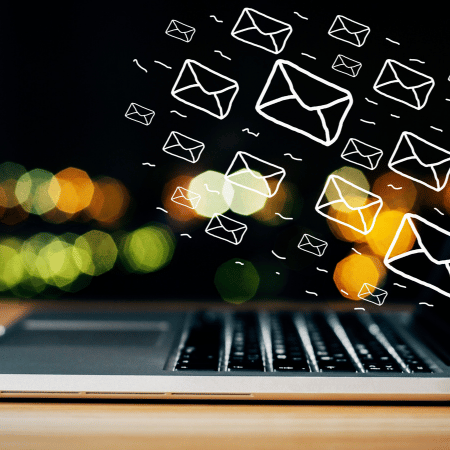Written by Glyn Hurll
In the rapidly evolving landscape of digital marketing, where social media platforms, influencer marketing, and AI-driven strategies dominate discussions, email marketing might seem like an outdated tactic. However, the reality is quite the opposite. As we move towards the final quarter of 2024, email marketing remains a cornerstone of successful digital marketing strategies. This enduring relevance is not by chance—email marketing offers unique advantages that other channels struggle to replicate.
This blog will explore why email marketing is still a powerful tool for nurturing leads and driving conversions in 2024, moving to 2025. I’ll dive into the reasons for its ongoing effectiveness, discuss the latest trends, and provide actionable tactics to help you maximise the impact of your email campaigns.
The Enduring Power of Email Marketing
Direct Access to Your Audience
One of the primary reasons email marketing remains effective is its direct nature. Unlike social media platforms, where algorithms dictate whether or not your content reaches your audience, email marketing allows you to communicate directly with your subscribers. When someone subscribes to your email list, they’re granting you permission to enter their inbox—a highly personal space that they check regularly. This direct access is invaluable for building relationships and driving engagement.
High ROI
Email marketing consistently delivers one of the highest returns on investment (ROI) among digital marketing channels. According to various studies, for every pound spent on email marketing, businesses can expect an average return of £36 to £42, depending on the industry. This high ROI is due in part to the relatively low cost of email marketing campaigns compared to other forms of advertising, as well as the ability to segment and target your audience with precision.
Personalisation and Segmentation
Personalisation is no longer just a nice-to-have; it’s an expectation. Consumers today expect brands to deliver relevant content tailored to their interests and behaviours. Email marketing platforms have evolved to offer sophisticated segmentation and personalisation capabilities, allowing you to send highly targeted messages that resonate with each subscriber.
By leveraging data such as past purchase history, browsing behaviour, and demographic information, you can create dynamic email content that speaks directly to the needs and preferences of each recipient. This level of personalisation not only improves engagement rates but also builds trust and loyalty among your audience.
Measurable and Data-Driven
Another reason email marketing remains indispensable is its measurability. Unlike some other forms of marketing, email campaigns can be tracked and analysed with great precision. You can measure open rates, click-through rates, conversion rates, and more, allowing you to understand what’s working and what’s not.
This data-driven approach enables continuous optimisation of your campaigns. By testing different subject lines, call-to-action buttons, and email formats, you can refine your strategy over time to achieve better results.
Versatility and Integration
Email marketing is incredibly versatile. It can be used for a wide range of purposes, from nurturing leads and driving sales to retaining customers and building brand loyalty. Whether you’re launching a new product, promoting a sale, or simply staying in touch with your audience, email marketing offers a format that can be tailored to your needs.
Moreover, email marketing integrates seamlessly with other digital marketing channels. For example, you can use email to amplify the reach of your content marketing efforts, drive traffic to your social media pages, or encourage participation in online events. This integration makes email marketing a ‘hub’ in your broader marketing strategy.
Trends Shaping Email Marketing in 2024
As with any marketing channel, email marketing is constantly evolving. To stay ahead of the curve, it’s important to be aware of the trends that are shaping the landscape.
AI and Automation
Artificial Intelligence (AI) and automation are transforming email marketing by enabling more sophisticated personalisation and segmentation. AI can analyse vast amounts of data to predict customer behaviour, allowing you to send emails at the optimal time with the most relevant content.
Automation tools are also becoming more advanced, making it easier to set up complex email sequences that nurture leads over time. From welcome series to abandoned cart reminders, automation allows you to stay in touch with your audience without needing to manually manage every campaign.
Interactive Emails
Interactive emails are becoming increasingly popular as brands look for ways to engage subscribers in new ways. These emails include elements such as surveys, quizzes, polls, and carousels that allow recipients to interact with the content without leaving their inbox.
Interactive emails can significantly boost engagement rates by providing a more dynamic and immersive experience. They also allow you to gather valuable data about your audience’s preferences and behaviours, which can be used to further personalise future campaigns.
Focus on Privacy and Data Security
With growing concerns around privacy and data security, regulations like the General Data Protection Regulation (GDPR) and the California Consumer Privacy Act (CCPA) are having a significant impact on email marketing. Today, it’s more important than ever to ensure that your email practices are compliant with these regulations.
This includes obtaining explicit consent from subscribers, providing clear options for unsubscribing, and being transparent about how you collect and use data. By prioritising privacy and data security, you can build trust with your audience and avoid potential legal issues.
Hyper-Personalisation
While personalisation has been a key trend for years, the next frontier is hyper-personalisation. This involves using real-time data to deliver highly contextualised content that is not only personalised based on past behaviour but also relevant to the current moment.
For example, a retail brand might use weather data to send emails promoting raincoats during a storm or sunglasses on a sunny day. Hyper-personalisation requires a deep understanding of your audience and the ability to act quickly on data insights.
Effective Email Marketing Tactics
To make the most of email marketing in today’s world, you need to employ tactics that align with the latest trends and best practices. Here are some strategies to consider:
Segment Your Audience
Segmentation is the foundation of effective email marketing. Rather than sending the same message to your entire list, segment your audience based on factors such as purchase history, engagement level, location, and demographics. This allows you to tailor your content to the specific needs and interests of each group, leading to higher engagement and conversion rates.
Leverage Automation
Automation can save you time and ensure that your audience receives timely, relevant emails. Set up automated workflows for key stages in the customer journey, such as welcome emails for new subscribers, abandoned cart reminders, and re-engagement campaigns for inactive subscribers.
Optimise for Mobile
With the majority of emails now being opened on mobile devices, it’s crucial to ensure that your emails are mobile-friendly. This means using responsive design, keeping content concise, and ensuring that links and buttons are easy to tap on small screens.
Test and Optimise
Continuous testing is key to improving the performance of your email campaigns. Conduct A/B tests on different elements of your emails, such as subject lines, send times, and content formats. Use the insights gained from these tests to optimise future campaigns.
Prioritise Data Privacy
Make sure your email marketing practices comply with all relevant data privacy regulations. This includes obtaining explicit consent from subscribers, providing clear opt-out options, and being transparent about how you collect and use data. By prioritising data privacy, you can build trust with your audience and maintain a positive brand reputation.
Use Interactive Content
Incorporating interactive elements into your emails can boost engagement and make your campaigns more memorable. Consider using features like polls, quizzes, and interactive product carousels to create a more engaging experience for your subscribers.
Conclusion
Despite the rise of new digital marketing channels, email marketing remains a powerful tool today. Its direct, personal nature, high ROI, and versatility make it an indispensable part of any marketing strategy. By staying on top of the latest trends and employing effective tactics, you can leverage email marketing to nurture leads, drive conversions, and grow your business.
As we move further into the digital age, the role of email marketing is likely to continue evolving. However, its core strengths—direct access to your audience, personalisation, and measurability—will ensure that it remains a vital component of your marketing toolkit for years to come.
About Glyn
Glyn Hurll is a dedicated marketing consultant with a strong passion for creating impactful content and digital strategies that drive business success. With extensive experience in marketing, Glyn blends an analytical approach to data-driven decisions with a creative touch in storytelling. Over the years, Glyn has successfully assisted numerous businesses in enhancing their brand visibility and achieving outstanding outcomes through focused marketing efforts. Whether it’s through informative articles, in-depth case studies, practical tips, or comprehensive digital campaigns, Glyn is committed to helping businesses thrive in the constantly evolving digital environment. Outside of marketing, Glyn enjoys staying updated on the latest industry trends and sharing valuable insights with his community.

